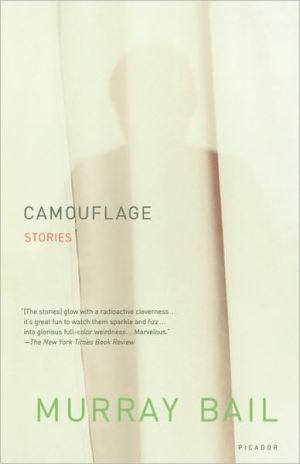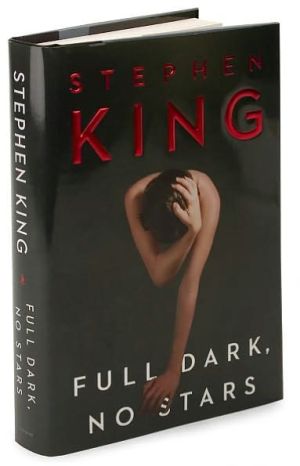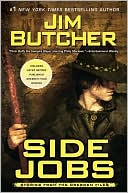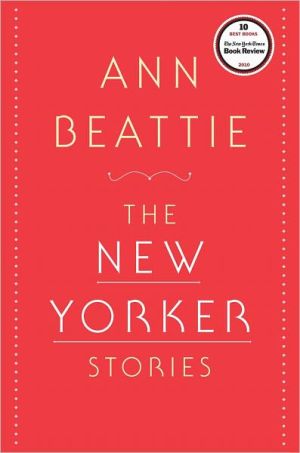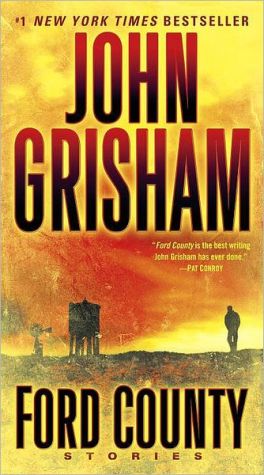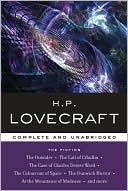Camouflage
From the “world-class Australian novelist” (The New York Times) comes a deft, angular, and highly entertaining collection of stories. “The Seduction of My Sister” tells of the increasingly bizarre events between siblings when a new family moves in across the street, while “Healing” recalls a vanished time when a boy’s headlong, innocent rush into certain disaster could be averted by a simple miracle. A man named Huebler decides to photograph everyone alive, and an unassuming piano-tuner is...
Search in google:
From the “world-class Australian novelist” (The New York Times) comes a deft, angular, and highly entertaining collection of stories. “The Seduction of My Sister” tells of the increasingly bizarre events between siblings when a new family moves in across the street, while “Healing” recalls a vanished time when a boy’s headlong, innocent rush into certain disaster could be averted by a simple miracle. A man named Huebler decides to photograph everyone alive, and an unassuming piano-tuner is sent to the center of Australia in 1943 to contribute to the war effort. A captivating, piquant collection from a master of the craft.ListenerExplores the relationship between words and meaning, appearance and reality . . . Bail does not rely on tricks.
CAMOUFLAGE (Chapter One)The Seduction of My Sister\ My sister and I were often left alone together. She was younger than me, about eighteen months. I hardly had time to know her, although we were alone together for days on end, weekends included.\ Our father worked odd hours at an Anglo-American tobacco company. And our mother, she had a job at Myer's. Ladies' shoes, manchester, toys and whitegoods were some of her departments. She worked Saturday mornings, and there was the stocktaking. She put in a lot of overtime, working herself to the bone. Some nights our mother arrived home after dark, more like a widow in black than a mother, and passed around meat pies from a paper bag, one for each of us, including our father. Otherwise we were 'left to our devices', our mother's term; I heard her explain to a neighbour over the fence.\ For a long time I took little notice of her, my sister, always at my elbow, in the corner of my eye. Whatever I was doing she would be there. More than once I actually tripped over my sister. She seemed to have nothing better to do than get in the way. She said very little, hardly a word. She and I had different interests, we were interested in totally different things, yet if I was asked today what her interests were I couldn't say. Tripping over her once too often or else wanting nothing more than to be left alone I would turn and shout at her to go, get lost, even giving her a shove; anything to get rid of her. Half an hour later she would be back, all smiles or at least smiling slightly as if nothing had happened.\ My sister was skinny, not much to look at. She had short hair in a fringe, and a gap between her teeth. If anybody asked what colour eyes I could not answer, not exactly. There was a mole above her lip, to the left, almost touching her lip.\ Taking an interest in something or standing near a group she had a way of holding her mouth slightly open. I can't remember a single thing she said.\ The mole could have by now transformed into a beauty spot, I've seen them on other women. Brothers though are supposed to be blind to the attractions of their sisters.\ Our father had a small face, and although he didn't himself smoke the odour of fresh tobacco followed him like a cloud, filling the passages of the house. I don't know about him and our mother. About their happiness or contentment even it was difficult to say. When our father spoke it was to himself or to his shoes; he hardly looked at our mother. In reply she would say nothing at all. Sometimes she would make a strange humming sound or turn to us and say something unrelated. Arriving home after standing behind a counter all day our mother looked forward to putting her feet up. After the table had been cleared our mother and father often went over the various budgets, income and outgoings, gaining some sort of pleasure or satisfaction from the double-checking. If he saw us watching our father would give a wink and make a great show of scratching his head and licking the pencil.\ It was a short street, the houses dark-brick from the thirties. Each house had a gravel drive and a garage, although hardly anyone had a car, and a front hedge, every house had its box hedge, except directly opposite us, which was an empty block, the only one left in the street. It was surprising how long it remained empty, swaying with grasses, lantana in the left-hand corner. Who in their right mind would want to live all day looking across at us? Our father winked at us, our mother taking a breath, not saying a word.\ It remained then, a hole in the street, a break in the hedges, in the general tidiness, an eyesore to more than one.\ Nothing lasts, that is true; it goes without saying. Nevertheless, the morning we woke up and saw pyramids of sand and a cement-mixer on the block it was a shock to the system, the builders more like intruders than new neighbours, trampling over habits and feelings.\ Slowly, then rapidly accelerating, a house took shape out of the disorder and commotion; I would have preferred it to last forever, so much there to follow, to take in and assemble in my mind. I can't speak for my sister.\ Instead of retreating at right angles to the street like any other house, including ours, it was positioned longways, parallel to the street. It caused our father to give a brief laugh of misunderstanding. He called it 'The Barn'. Instead of bricks the colour of lamb chops which slowly turn brown, ours, it had cream bricks of a speckled kind, and grey tiles on the roof instead of the painted corrugated iron of ours.\ I came home one afternoon late to see my sister standing at our front gate as always, waiting for me; only, I could tell by the way she was twisting one leg around the other she was talking to someone.\ The Gills had moved in, their doors and windows wide open. Gordon withdrew a hand and introduced himself. He was their only son; about my age.\ The house inside was still smelling of paint. In his bedroom he had a stamp album and cigarette cards scattered on his desk, and merely shrugged at the model aeroplanes suspended from the ceiling, as if he had lost interest in them. We went from room to room, my sister and I. In the lounge Gordon demonstrated the record-player which opened on silver elbows into a cocktail cabinet. Shelves and glass cabinets displayed plates and bowls and porcelain figures. From another room a clock chimed. Now and then Gordon stepped forward to explain something or take it from our hands, then returned to the window, answering a question or my sister's exclamations. Across the street directly opposite stood our house, stubborn, cramped-looking. It was all there to see.\ Mr Gill put down a lawn, bordered by roses, not ordinary roses, but dark roses, and stepping stones of slate to the front door. Mr Gill had a moustache, the only one in the street, and a strong set of teeth. From the moment they met he called my father 'Reg', and made a habit of dropping it with informal gravity into every other sentence, sometimes flashing a smile, which pleased my father no end. 'Do you think, Reg, this weather's going to hold?' And, if he was in the middle of something, pruning or striding around to open the car door for Mrs Gill, who remained seated looking straight ahead, he'd glance up and with a single nod say 'Reg', and return to what he was doing. Even this pleased my father.\ It was our mother who suggested doubts. 'No one,' she was scraping the plates, 'is like them, not in this street. They might as well be from another planet.'\ With his wide shirt open at the neck our father put his finger on it. 'They're all right,' he smiled, 'they're extroverts.'\ Our mother always looked tired. I wondered why she kept on working, what on earth for, but she went on almost every day of her life, Saturdays included, at Myer's. Through the store she bought a washing machine and a Hoover, demonstration models, otherwise brand new. In turn the store made a new fridge possible, the varnished icebox ending up in the garage, along with our father's hat-stand, tennis racquet in its press, and a God-forsaken electric toaster. Chimes were added to the front door, a new letterbox smartened up the front, father's idea, displaying our number in wrought iron beneath the silhouette of a Mexican asleep under his hat.\ Taking a tour of our house one afternoon Gordon barely said a word. A floorboard kept creaking; I noticed the light was yellowish and the walls, carpets and chairs had a scruffy plainness.\ In no time we were outside by the fig tree where I searched around to retrieve something. 'That'd be a hundred years old,' I pointed with my chin.\ To demonstrate, my sister in her cotton dress shinned up into the first fork. Grinning, she looked like a monkey, I could have clocked her one. I glared and hissed at her, but she took no notice, which only gave the impression she was used to such cruel treatment.\ I steered Gordon into the garage, my sister scrambling down from the tree, not wanting to be left out. Our mother and father never threw anything away. Poking around I held up things I thought might be of interest, waiting for his reaction. And Gordon too began examining things, the old tools, tin boxes, our mother's dressmaker's dummy from before she was married. He squatted down, my sister alongside. It was Gordon who came across the gramophone records still in their brown-paper sleeves. Reading the labels one by one he carefully put them back.\ I thought he was being polite.\ 'Tell you what.' I had an idea. 'You go and stand on your front lawn,' I glanced up at the sky, 'and I'll send a few of these over the roof at you.'\ 'What for?' He remained squatting.\ It took a while for the penny to drop.\ 'See if you can catch them or something, I don't know.' I had to push him. 'You stay here,' I told my sister.\ Before Gordon could change his mind I yelled out from the back of our house, 'Coming now!' And in a simple quoitthrowing motion sent up in the half-light the great Caruso singing something mournful in Italian. It soared above our iron roof, the disc, and in a moment of dark beauty tilted, almost invisibly, and hovered like the tenor holding a high note, before returning to earth. My sister and I both had our mouths open. I reached our gate, sister alongside, to see Gordon waiting on their patch of lawn, hands in pockets, suddenly give a hoarse cry as the black 78 brushed his shoulder and thudded into the lawn beside him.\ Hardly able to run, laughing too much, I crossed the street. 'What d'you reckon?' I gave him a shove. 'It almost took your head off.'\ Picking up the record Gordon wiped it with his sleeve.\ Nobody spoke. He could have gone one way or the other, I could see. I took another look at him, my sister gaping at one of us, then the other. I ran back to my position, not saying anything.\ I sent over Land of Hope and Glory and, before he could recover, The Barber of Seville, followed by the Nutcracker Suite. I had others in a stack at my feet when the street lights came on, and Mrs Gill began calling in her musical voice, 'Gor-don.'\ Anyone could see he was not suited for sporting activities. The sloping shoulders, the paleness, even the hang of his arms—uncoordinated. Yet the following night Gordon was in position early, pacing up and down, looking over to our side.\ I waited for it to be almost dark. To my sister I called out, 'Look at me. See how I do it. If you like, you can have a go later.'\ I began throwing and threw, in quick succession, one musical disc after the other. They were hard to spot in the night sky, that of course being the idea, their closeness suddenly revealed by a faint hissing near the face or the back of the head. They were lethal. Quick reflexes were necessary. And concentrating hard and working on his technique Gordon took everything I sent at him. He used his feet, swaying from the hips. With each throw of mine the better he became; and so his confidence grew. It wasn't long before he began in a lackadaisical manner grabbing at the black shapes as they came down at him or past him, managing to pull down in mid-air one in three or four, without saying a word, even after leaping with an arm outstretched, thereby putting pressure right back on me on the other side, sister looking on. Some I tried sending in low or at unexpected angles, anything to catch him off balance.\ My sister had moved to the front gate where my throwing efforts could not be seen, where instead she could observe Gordon facing up to the onrushing discs. For a while the pressure began to get to me; I had to talk to myself. The heads of Mr Gill's prize-winning roses were severed; another night, a disc I gave too much wrist kept on going above Gordon's shout and outstretched arm and smashed against the mock louvred shutters Mr Gill had bolted to the wall, showering Gordon with fine-grooved shards. Almost before he could recover I sent a recital of a legendary pianist, forget his name, Jewish, who died just the other day: wide of the mark, wrong grip, it sailed through the open window of the Gills' lounge room, my sister and I waiting for the crash of all that bonechina which never came. There were moments of ordinariness, moments of poetry. Simplicity, I realised, produced elegance, not only in the throw, in Gordon's response as well. One night, Melba, collector's item I'm told, sliced through Mr Limb's new telephone wires next door which fell over Gordon's face and shoulders like string. Gordon froze, my sister too; hand went to her mouth. They didn't have a clue about electricity, Gordon and my sister were not mechanically minded. Realising he was not about to be electrocuted Gordon kicked the wires and some of his embarrassment aside and went back to his crouch.\ Engrossed in our separate tasks we hardly spoke, every throw presenting a different set of problems. It changed Gordon, it opened him up. He'd come around to my side early, rubbing his hands as if it was freezing, my sister looking on.\ 'One of those records the other night,' he followed me into the garage, 'boy, was it funny.'\ I was sorting through the few that were left.\ 'You ought to hear Laughing Gas one day. It had the old man rolling on the floor.'\ Along with Little Brown Jug, the Satchmo selections and Sing, Sing, Sing it would have been our father's. Our mother, I was told, had a singing voice. Always with a grin hovering at the ready our father had a taste for imaginary honky-tonk playing; he made the cutlery jump on the table, sister and I watching. I began putting the remaining 78s back in the trunk.\ 'What are you doing?' Gordon grabbed my shoulder. He began reading the labels. 'What about these?'\ At that moment I wanted to pause; something felt out of place. Twice he whistled he was ready. I stared at my fingernails, waiting to think clearly. A few houses away a dog barked, and someone was trying to start a motorbike.\ It took less than a week, if that, to go through the remaining 78s, and when they were gone we tried chipped or broken discs, until it was too difficult to throw or nothing was left of them. Even so, when I realised the entire collection had gone, a feeling spread in my stomach of corresponding emptiness.\ I dismissed Gordon's suggestion we continue, using saucers, his idea of a joke: saw him nudge-nudging my sister. She was hanging around us, always there. A glance at her scrawniness could trigger irritation in me, I don't know why. Anything he said she'd listen, mouth open in that way. I would have said, look, scram, buzz off; words to that effect. I was about to, when Gordon reached for something wrapped in newspaper under the bench, and we squatted, sister too, I could see her pants.\ Lifting it out I untied the string.\ 'Eek!' She clutched at him.\ I held up a fox with glass eye.\ 'O-kay,' I swung experimentally. 'This'll do. What's the matter?' I stared at my sister. 'I can throw it.'\ Before she married, our mother dressed up for special occasions, little hats, veils, dresses consisting of buttons and tiny flowers. One photo in the album has her on a shopping spree with her mother in the city, each with a cheesy smile, like sisters. Shortly after, she met our father, I forget where. Near the back door I was adjusting my feet, getting the balance right. I swung a few times, began again, swung once more, again, suddenly letting go with all the smoothness I could muster, the centrifugal force of the lopsided fox hop-hopping me forward like a shot-putter.\ Leisurely, the doglike shape began flying, its tail outstretched. At the chimney it somersaulted in slow motion against the night sky, appeared to set course, and with snarling teeth nosedived straight for Gordon across the street, chatting to my sister. At her cry he tried to swerve. The fox followed, sinking its fangs into his throat, as he rolled on the lawn.\ A fox is pleasant to hold, weighted at one end, a living thing. I never tired of sending it over, enjoying the accelerating moment of release, then running up our drive to follow its twists and turns, flash of orange tail, its Stuka-dive forcing Gordon into the acrobatics of a goalkeeper, exaggerated for my sister, looking on. 'Improvisation is the mother of invention!' I heard him call out. My sister swallowed anything. At the same time she had a frivolous side; I could imagine reaching our gate to find her parading in front of him, fox draped over one shoulder, hand on hip for him.\ As mentioned, the houses each had a hedge, except the Gills', which had the picket fence, leaving the house naked. The Gills didn't seem to mind, on the contrary. Every other night the lights would be blazing, more like an ocean-liner than a house, the rest of the street as dark as the sea. The rectangle of illuminated lawn appeared as a billiard table, the beds of roses, shutters flung open, car in the drive all added up to a welcoming, optimistic air. After the loss of the fox I sent over a rubbish-bin lid, glittering chassis of a crystal-set, tennis racquet in its press, other objects so poor in the aerodynamics department they barely cleared the roof. They were not adding anything; I was beginning to lose interest.\ The card table had a way of setting its legs in mid-air, to make a perfect four-point landing on the Gills' lawn; but that only happened, I think, twice.\ Our father would begin picking his teeth with a match, and for the umpteenth time tell us what a time he had, the best years, working with cattle in the outback, before he married, only ten months, but enough to deposit slowness in his speech, a corresponding glaze in our mother's eyes, and a green trunk full of Aboriginal weapons in the garage. I had forgotten they were there. Gordon was holding the boomerangs in his hand, authentic tribal weapons, not the tourist kind.\ 'You might as well put them back,' I said. 'They're too dangerous.' When I turned my sister was already skipping around to the front, Gordon at her heels.\ 'Listen, will you?' I crossed the street. I grabbed my sister. 'You're not going to watch me, right?' I felt her squirming. 'Then you'd better keep your eyes open. In case someone's coming, that's why. These things,' I sounded prim, 'could kill someone.'\ Gordon was in no doubt as to the serious turn the game had taken. Boomerangs were altogether different from the grimacing masks and decorated shields from New Guinea displayed in the room Mr Gill called his 'study'. If one caught him in the face it would have been curtains. We knew, Gordon and I, my sister too; Gordon began going through his stretch exercises. Instead of hesitating, let alone calling a halt, I was gripping the boomerang at one end.\ I gave plenty of elbow: let go.\ By the time I reached the street the boomerang was ahead of me. Gordon on their lawn was shielding his eyes. My sister had moved from the gate to be alongside. The mulga blades came swirling out of the fading light in a fury, seeking him out. Keeping his eyes on it, swerving and ducking at the last moment, he avoided being hit, just. He was impressive, I'd have to say. From then on the vicious insistent things kept coming at him, at the strangest angles, finding him in roundabout ways, where least expected, side-on without warning or from behind. While I had never underestimated his confidence, I think I underestimated his abilities in general. He had a certain course of his life marked out, even then. He would always succeed where I would not, I could see. In the end my life became something of a shambles. His would not.\ Gordon wore his father's yellow driving-gloves and was grabbing at the boomerangs as they flew past, my sister clapping encouragement whenever he managed to pull one down. Keen eyesight, reflexes played their part, fair enough, knowing which ones to leave, sure; but as I watched I began to find his way of crouching and twisting, particularly in the region of his hips, distasteful. He displayed a fleshy alertness I found off-putting, just as when he received a given object and turned it over in his hands I saw his arms were precisely the pale arms with black hairs I found unpleasant, repulsive even. I have always had trouble with such hairy arms, my sister didn't seem to mind. Every night her job was to whistle or cough if a motor cyclist appeared or a pedestrian, such as Mr Limb, a bachelor who lived next door, deciding to stretch his legs, it's all she had to do; otherwise I was throwing blind. But she was more interested in warning him, Gordon, crouching there on the slippery lawn; more than once letting out a cry, which may well have saved his skin. I had to cross the street and tell her to pipe down, we didn't want the neighbours coming out. If she didn't we'd have to stop, it would be the end. As I laid down the law she began to blink, I could see she was about to cry. Gordon nearby examined his elbow saying nothing.\ Gramophone music came from the Gills' open windows, men and women moved in the brightly lit rooms, now and then a man leaned back laughing his head off. This flat boomerang felt longer on one side, inscribed with dots and whorls. Without thinking too much I flicked it, perhaps that was it, for as I ran with it up the drive the thing hovered like a lost helicopter blade above our chimney, before returning. Slipping on the gravel I ran back just as our father stepped out the door.\ 'Bloody crow!' he waved over his head. 'Did you see that?'\ It clattered into the fig tree, but by then our father had cocked his ear to the Gills' party noise.\ 'Benny Goodman,' he gave a bit of a jig, 'at the Carnegie Hall. Hello, how's Gordon tonight?'\ Gordon pulled up panting, sister alongside. As soon as our father went back in our mother began getting stuck into him, listing things missing in him.\ 'Think.' Gordon was shaking me. 'Where did you say it landed?'\ 'I'll find it in the morning. Don't worry about it.'\ His answer startled me. 'Put it off and never find it again. That'd be right.'\ Already up in the tree my sister dropped it at his feet. Wiping it with his handkerchief Gordon held the flat blade up to the light. Whatever he saw pleased him, for he lunged with both hands at my sister as she passed, ignoring me.\ No matter how hard I tried I never managed to make another one return. And when the trunk was empty, even of fighting boomerangs, which Gordon explained were never meant to be thrown, the problem again was finding something to send over. In this and other matters Gordon revealed a singlemindedness I never had. Gordon knew what he wanted, usually had a fair idea. What I thought hardly worth the effort he invariably thought the opposite. Already he had a sureness in summing up the other person, then no longer taking them into account.\ Anything I could lay my hands on I was letting go. I found all sorts of things we did not want. Nothing ever meant much to me. Even today I am casual about possessions. With people too I come and go. In this I resemble my casual father, who in the end disappointed people, my mother and others.\ In a single night I sent over a pair of suit trousers, striding across the sky, a row of coat-hangers, textbooks I would never open, wooden lavatory seat. I watched as every copy of Life presented to me by an amateur photographer uncle changed hands, the history of the postwar world turning over like a newsreel. Patterns form without anyone being fully aware, I see now. Our mother wore the same shoes for a week and a half, our father never changed his hat.\ Electric light bulbs lit up the sky, followed by the first fluorescent tube; our pop-up toaster another time trailed its plaited cord. Problems of a technical kind: it took several attempts to hurl the standard-lamp over, a ceremonial spear. The electric radiator made the journey, the single red bar describing quite fantastic arabesques, catching Gordon talking in the shadows to my sister by surprise. When occasionally she skipped over to my side, expressing interest in what I was doing, I could see she was itching to get back to him and whatever he was saying, on the other side. I set the American alarm clock for seven o'clock in mid-flight, and as it began ringing Gordon reached out and silenced it with one hand. I chucked half a dozen eggs, we kept fowls in the backyard, rotten tomato, a navel orange, another joke, Gordon collecting it on the neck. He said he confused it with the moon, but he was talking to my sister, I saw them. And for the first time my sister turned on me, 'That's going to leave a bruise,' as I ran up arranging a country grin, in the manner of our father.\ Eventually we come up against things said by others which cannot be explained, not at the time. The night our mother talked about 'taking in ironing' made us laugh our heads off, my father and I; my sister too after a glance, our father laughing the loudest, almost choking, at the same time placing his weakened hand on my mother's arm, which she pulled away. 'Your mother sometimes comes out with all kinds of rubbish,' wiping the tears from his eyes. At the table my sister sat demurely. It made me look twice, our mother too. The few jokes I cracked in her direction, not worth repeating, she ignored. The usual family racket we made she seemed to find irritating, which in turn irritated us, at least our mother.\ From the beginning, I began to see, I was doing all the work. To Gordon I suggested we change positions. Operating in darkness near our back door I could do my bit with my eyes shut, whereas on his side light was absolutely essential, he pointed out. 'Without proper light I've no idea what's coming my way.' I'm at the receiving end, let's not forget, he actually said.\ Besides, he pointed out, we have each attained a degree of efficiency in our respective roles. 'Isn't that right?' he said to her, alongside.\ The pale ironing board in flight reminded me of the loose skin above my mother's elbow. Difficult to send up and over it was more difficult still for Gordon receiving, a matter of manoeuvring desperately to get side-on to the torpedo-shaped thing. At the same time Mr and Mrs Gill stepped out for a night at the theatre or somewhere. By the gate I watched Mrs Gill, fox over one shoulder, although the night was warm, flash my sister a smile. 'So this is Glenys?' I heard her say. After that she made a point of saying hello, Gordon looking bored, as Mr Gill strode around to open her car door.\ To get my sister's attention Gordon sometimes touched her with his foot. Other times, talking to me, he'd drape an elbow over her shoulder. In turn, my sister remained still, no longer jumping about. He subscribed to American magazines and gave her books to read.\ Birdcage, oval mirror reflecting the clouds, a perfectly good floral armchair.\ The smallest things amused my sister. She had what I would say was a childish delight in small and modest things. It was one of her attractive sides. And yet when I sent over things chosen for her she reacted as if they had dropped from the sky into his lap, as if it had nothing to do with me, on the other side.\ I submitted silver coins when I had some to spare. 'We're down to our last shekels,' I called, the coins shooting across the sky as falling stars.\ It was she who pointed them out to him, I could hear her cries. It would have been their appearance amongst the stars that caught her eye, not their value; I can't answer for him. As always Gordon hardly said a word; I mean to me: I could hear him murmuring to her. Mostly you never knew what he was thinking; he never gave much away. Vase of flowers, innerspring mattress, dustpan and brush. By the time I'd reach their gate he'd still be talking to her, my sister taking in whatever rot he came out with. It had been the same with me. So practised had he become he'd merely extend an arm and take whatever I'd sent over or simply move a step, holding her by the waist, a provocative move.\ She was out of my hair, I was no longer tripping over her, a good thing; at the same time, I felt great rushes of irritation at the way she transferred her attention lock, stock and barrel to him, in that trusting way of hers, mouth slightly open. If our mother saw two people with heads together they were 'as thick as thieves'. And more than once she said, 'No one likes anyone whispering.'\ A large oil painting from our mother's side used to hang in the bedroom, a summer landscape, on canvas. It aquaplaned into multiples of parched hills and fat gum trees. Gordon received it with open arms, my sister helped him lower it to the ground, and listened as he launched into a lecture, pointing out the strengths and weaknesses of the composition. After examining it and wiping it with his handkerchief he pronounced it too fragile to travel, my sister nodded in agreement.\ In the way the boomerang came back over the roof it was only a matter of waiting before our father's expression returned to one of smiling slightly. Mr Limb, next door, used to say, 'I don't have a hobby or a pastime,' and as he reached retirement, 'Most of my life has passed, and now just when I need it I don't have a hobby or a pastime.' The subject of early retirement occupied his mind so much he suffered excruciating headaches; he took days off from the work he no longer enjoyed, on medical advice.\ Even then I felt sympathy for Mr Limb. I don't know what in the end happened to him. The umbrella jerked open and parachuted down, ironic cheers from Gordon's side, ashtrays were never used in our house, nest of tables, mother's, and our father's tan suitcase opened its mouth and dropped a sock on the telephone wires.\ From my side in darkness I would hear Gordon's voice, followed by her laugh. Rolling pin tumbled over, dusted with flour. They would have trouble finding the knives and forks. I no longer bothered rushing around to see how the latest thing was received. We were going through the motions, little more. Only later do we realise something of value has slipped away. Whatever had been worth the effort in the beginning was coming to an end; a feeling I would recognise in later years.\ I squatted near the garage, my sister, Gordon at her elbow, rummaging through what little was left.\ Embroidered tablecloth, their idea, didn't make the distance; I could have told them that. At any given time there is only a limited number of ideas of value, I wanted to say. And before long we exhaust them as well. I remained squatting, watching them. If one of them went somewhere the other followed. I was left alone, to one side.\ That night when my sister came skipping around to my side I thought she was coming around to my way of thinking, whatever that was.\ Instead, she had a suggestion, and as I listened I felt my father's grin beginning to run amok; but she was looking away strangely and speaking vaguely.\ Thinking the thing she suggested was going to be the last I got to my feet, not at all laboriously, and went inside. I came out with it rolled up.\ So many things passed through my hands; nevertheless, I found it necessary to use all my skills with this one, and wondering whether it was her idea or his dispatched, after some difficulties, my sister's favourite party dress. I could follow its progress, walking up our gravel drive. Billowing from the waist it elbowed gently past the chimney. And in its determination, oblivious to me or anybody else, I glimpsed my sister there and in years to come. She would always be determined, always there, her way, while I felt within a heavy casualness, settled and spreading.\ Whatever Gordon was expecting it wasn't this. Directly above him the translucent dress began descending, flapping gently at the edges. Not sure whether to grab it with both hands, or perhaps deceived by its slowness, the slow hip and narrow waist movements, he was caught wrong-footed. The white cotton dress smothered him.\ I waited for my sister to rush forward and help, as she had all along, but she looked on, not lifting a finger, letting Gordon disentangle himself.\ From the gatepost if I glanced across the street I would see Gordon's outline, kicking gravel, my sister discussing something. I had almost forgotten what my sister looked like. The dark bulk of the house now came between her features and me, obscuring aspects of her personality even. Out of habit I hung around near our back door. From inside the kitchen I heard the soft thudding of our mother ironing, occasionally the murmur of our father.\ Things at least seemed to be steady there, I remember thinking.\ At the sound of her voice, my sister, I stood up. Gordon was one step behind, both hands in his pockets, pursing his lips.\ My sister whispered again. Why the whisper? I wanted to ask. Facing her, I noticed a rushed, wide-open expression I hadn't seen before.\ Still I didn't say anything. After a while my sister went inside, leaving us. He and I stood there. Gordon glanced at his watch. When she came out in her white party dress he stepped forward.\ 'How am I?' she asked in a small voice. She was speaking to me. The gap opened between her teeth as she smiled.\ It allowed me to place my hands under her arms. She was much heavier than I imagined, I could feel the soft swell of her breasts. She allowed my hands to remain there; she was my sister.\ I looked at her once more. 'Are you all right?' I was on the point of saying, 'Is this what you want?' Other questions reached my tongue, but her body had surrendered, and by then I had taken an interest in the whole technical question; I began gathering momentum. In an almighty heave-ho, putting my whole body into it, I let go.\ Trust and optimism were always her main characteristics. Now she tilted her chin, and dog-paddled among the stars, then clasped her hands more like an angel than my sister. Putting her trust in me she was now putting her trust in him. I concentrated on the mole near her lip, a point of focus, until it too began diminishing, along with the pale hopes of her body, gap between teeth, fringe, balanced on one foot, listening: all this blotted out by the chimney.\ I heard Mr Limb's cough. He was setting out on his evening walk, for health reasons. I felt so much around me slipping, accelerating, beyond my grasp; for I was left with nothing. Running from my side towards the light I began calling my sister's name, to where she had gone.\ CAMOUFLAGE Copyright © 2002 by Murray Bail.
The Seduction of My Sister3The Drover's Wife25Life of the Party32Zoellner's Definition41Healing51Portrait of Electricity55Paradise71Ore79Cul-de-Sac (uncompleted)89A, B, C, D, E, F, G, H, I, J, K, L, M, N, O, P, Q, R, S, T, U, V, W, X, Y, Z109The Partitions119Home Ownership131Huebler140Camouflage176
\ From the Publisher“[The stories] glow with a radioactive cleverness...it’s great fun to watch them sparkle and fizz...into glorious full-color weirdness...Marvelous.” —The New York Times Book Review\ “Darkly comic...[Bail] resists, by sheer force of invention, the drag of glib moralizing on suburban lifelessness.” —The Washington Post Book World\ “[An] entertaining collection...a cross between Orwell and Kafka...reminiscent of Bernard Malamud at his most inspired...Exquisite work from a most unusual master craftsman who’s one of his continent’s finest writers.” —Kirkus Reviews\ “An illuminating, dexterously written collection.” —Publishers Weekly\ \ \ \ \ \ Times Literary Supplement[Bail] shows a lively inventiveness in finding new forms.\ \ \ ListenerExplores the relationship between words and meaning, appearance and reality . . . Bail does not rely on tricks.\ \ \ \ \ Times Literary Supplement[Bail] shows a lively inventiveness in finding new forms.\ \ \ \ \ Publishers WeeklyA host of distinctive, genuine characters, all at the mercy of life's folly and its slapdash potential, parade through Australian writer Bail's unconventional new collection of 14 short stories. Devoid of any kind of unifying theme, the volume includes several tales that play out as bizarre, abstract vignettes, while others are stunningly vivid and affecting, as in the standout opening story "The Seduction of My Sister." In it, a boy who feels that his younger sister is a terrible pest concocts an increasingly dangerous outdoor game with a new neighbor. Lobbing progressively larger household items back and forth over the rooftops makes for hours of amusement, until his sister poses the ultimate dare. The vacuum of smalltown life may have gotten the better of Sid in "Life of the Party." Perched high and dry in his son's tree house, Sid observes as neighbors and friends congregate drunkenly in his backyard for a barbecue he never bothers to host. In "Huebler," a man embarks on the "strange ambitious task" of photographing every living person and cataloguing each in a uniquely identifying category, i.e., "At least one person who may outlive art." In the title story, middle-aged Eric Banerjee, a married Adelaide piano tuner, is drafted in 1943 and sent to Australia's Northern Territory. After surmounting some initial shyness, he bonds with the other men in his troop, conceding that these are indeed "his happiest days." Bail (Homesickness) is at his strongest when writing from the shadowy corners of suburbia, much like A.M. Homes. The book's organizational structure suffers from a jarring irregularity, and a few entries, though they demonstrate the author's love of all things peculiar, seem thrown in as afterthoughts. Still, this is an illuminating, dexterously written collection, wildly uneven but uniformly potent. (May) Copyright 2002 Cahners Business Information.\ \ \ \ \ Library JournalReaders who enjoy fanciful, postmodern work in the tradition of Donald Barthelme and Italo Calvino will enjoy this delightful collection of gleefully absurdist short stories by acclaimed Australian writer Bail (Homesickness). Anyone who approaches these stories with patience and an open mind will find many pleasures the least of which are Bail's inventiveness and gentle humor. In "Life of the Party," for example, a suburban husband invites his friends over for a cookout while his wife and children are out of town and then spends the entire time spying on them from his son's treehouse as they enjoy the party without him. "Huebler" features a photographer who is determined to document the existence of everyone alive. He begins by establishing a list of people to photograph, which includes "at least one person who is incapable of sin" and "at least one person who always has the last word." Enthusiastically recommended. Patrick Sullivan, Manchester Community Coll., CT Copyright 2002 Cahners Business Information.\ \ \ \ \ Kirkus ReviewsKitchen-sink realism and fantastic hyperbole are skillfully blended in this entertaining collection of 14 stories by the Australian author of the highly praised Eucalyptus (1998), etc. Most of the briefer stories, which suggest a cross between Orwell and Kafka, focus on eccentrics and obsessives at odds with either domestic complacency or bureaucratic imperatives—and, generally, those spun from the more bizarre premises work best. For example, in "Life of the Party," a suburbanite hiding in his son's tree house spies on neighbors he's invited to a nonexistent barbecue; "Portrait of Electricity" takes the form of a tour of a museum memorializing a deceased "great man"; and the smalltime investor in "ore" is physically transformed (literally) by his avarice and finickiness. A darker note is struck in "The Drover's Wife," narrated by a dentist whose wife had left him 30 years earlier, and who "finds" her again, as the subject of a vividly realistic painting—which reveals, as do his ingenuous memories of her, an irrepressible spirit unforgivably stifled by his own prudishness and dullness. The best of the longer tales include "Huebler," an amusing fable whose eponymous protagonist aspires to photograph every living human; and "The Seduction of My Sister," whose unnamed narrator describes his adventure with another teenaged boy, tossing old phonograph records over a rooftop, then catching them as they fall. The "game" escalates, including ever-bulkier objects (and becoming a perfect metaphor for adolescent bravado, rebelliousness, and emergent sexuality), as the story moves surely toward its memorable magical-realist ending. Even better is "Camouflage," the tale of a passive, self-effacingpiano tuner who is drafted into the Australian Army in 1943, and finds muted fulfillment in a menial task that is, in its way, a rudimentary "art." It's a wonderful story, reminiscent of Bernard Malamud at his most inspired. Exquisite work from a most unusual master craftsman who's one of his continent's finest writers.\ \
